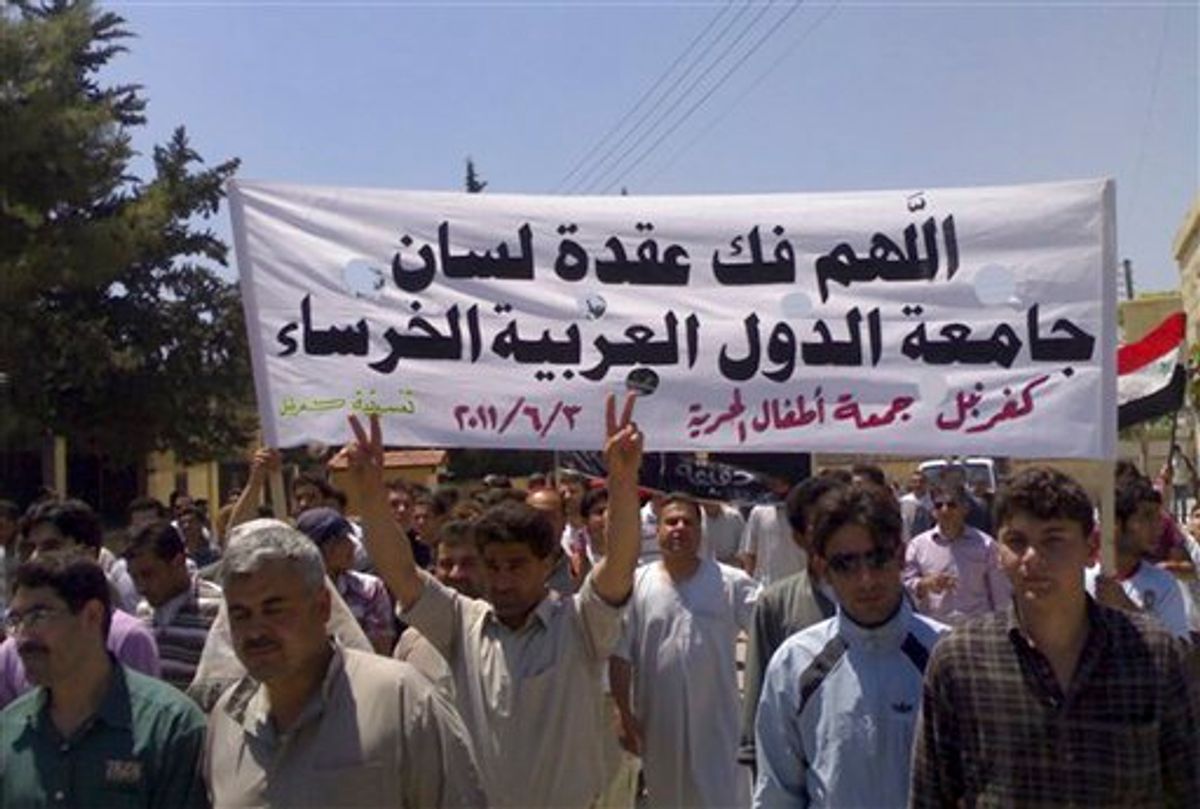At the beginning of the weekend, two thirds of Syria's Internet access blacked out; the third remaining was run largely by the government, Internet intelligence firm Renesy's reported. Nonetheless videos captured by citizen journalists of violent clashes between government forces and opposition protesters found their way out of the tumultuous country via satellite phones.
WARNING: This clip, (via Mashable) shows some extremely graphic, violent footage:
By Sunday, the online access resumed in Syria and the blackout had not served its intended purpose to qwell protest. According to reports from the Syrian authorities, Monday saw one of the bloodiest clashes to date in the three months of popular unrest against President Bashar al-Assad.
The government says more than 120 security forces have been killed in clashes with armed gangs in the north-western town of Jisr al-Shughour. Activists and locals have questionned this official line however, claiming that the deaths are a result of dissent within the army or mutiny, insisting that protesters are unarmed. The BBC compares different accounts of the events in Jisr al-Shughour, none of which can be verified as the foreign press are barred from Syria.
What is clear, however, is that the government will use their version of events to justify an even harsher crackdown. "We will deal strongly and decisively, according to the law, and we will not keep silent about any armed attacks that target the security of the country and its citizens," said Syria's Interior Minister Ibrahim al-Shaar.
According to the Guardian, "human rights organisations say more than 1,200 civilians, including 77 children, have been killed since the protests broke out in mid-March, while the government claims more than 200 of its personnel have been shot dead."
However, verifying anything about the situation in Syria is close to impossible, as evidenced by the events in Jisr al-Shughour. For this reason, bloggers living within the country have risen to prominence. One of the most popular and trusted blogs to have gained international regonition came from an Syrian-American writer, Amina Arraf, who blogged under the name Amina Abdallah, on the blog "A Gay Girl in Damascus."
Like a reported 10,000 other citizens detained by the authorities since the protests began, Arraf was taken away by three armed men late Sunday and remains missing, according to posts left on Arraf's blog by her cousin. Arraf, notes the Guardian "had become increasingly popular after capturing the imagination of the Syrian opposition as the protest movement struggled in the face of the government crackdown."
Meanwhile, the international community as represented in the U.N. remains split on how to respond to the critical situation. Last month Russia and China -- both veto-wielding permanent members of the Security Council -- expressed concerns about a European-backed draft resolution to condemn the Syrian government's harsh crackdown. But speaking in Washington yesterday, French foreign minister Alain Juppe called again for a vote on a resolution in the Security Council to condemn al-Assad's regime, Euronews reports.
"The situation is now very clear," Juppe said. "In Syria, the process of reform is dead and we think that Bashar has lost his legitimacy to rule the country. This a point that I have discussed with Hillary Clinton. We think, all together, that now we must go ahead and circulate this draft resolution in the Security Council."
However, Time's Tony Karon advises against holding our breath on western action:
Fear that if the [al-Assad] regime did collapse in a violent showdown, its most likely successor would be the Muslim Brotherhood gives pause to the U.S., Israel and the Saudis. They may not like Assad, but he's the proverbial devil they know, a man of predictable habit and therefore, by default, a bulwark of a certain kind of stability.
One thing seems certain for Syria, as we wait to see what form, if any, an international response might take, Karon is right to predict a "long, hot, morbid summer ahead."



Shares